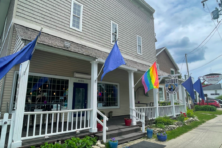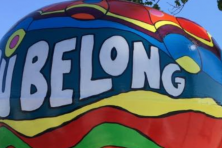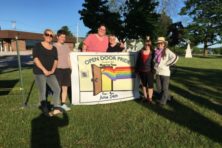School Pride
- Share
- Tweet
- Pin
- Share
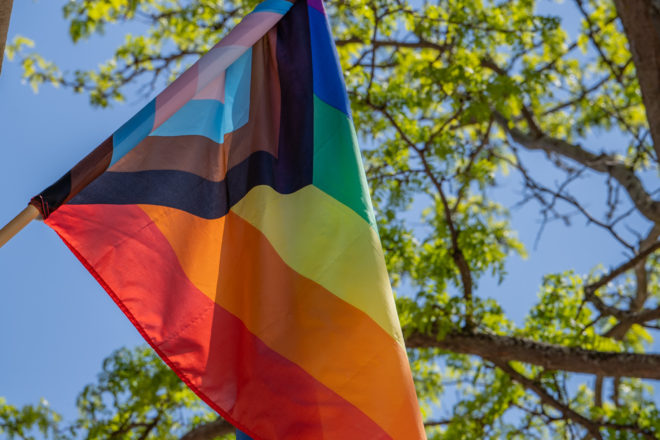
During last year’s Open Door Pride (ODP) festival, graduating Sevastopol High School senior Bianca De Larwell became the first recipient of ODP’s IDEA (Inclusivity, Diversity, Equality and Accessibility) scholarship. She accepted the award adorned with rainbow clothing and a bright smile on her face.
De Larwell’s confidence at the Pride festival was a far cry from how she described her middle school self: a person who felt isolated as she began to question her sexuality.
“I felt like I had no resources when I was trying to figure out what was going on with me,” De Larwell said. “I felt very alienated.”
That’s why she decided to form her own student organization, Sevastopol’s first Sexuality and Gender Alliance (SAGA), as a first-year high school student. To do so, she went to Lynn Kotte for help. The Sevastopol science teacher and known ally also knew Sevastopol’s process for starting new student organizations. It involved De Larwell pitching her idea to the school board directly, which she did with two friends. By their freshman year of high school, SAGA was officially up and running.
The club’s purpose, De Larwell said, was to give LGBTQ+ students a safe space in which to socialize and promote education on LGBTQ+ topics. It was for this work that ODP awarded its scholarship to De Larwell.
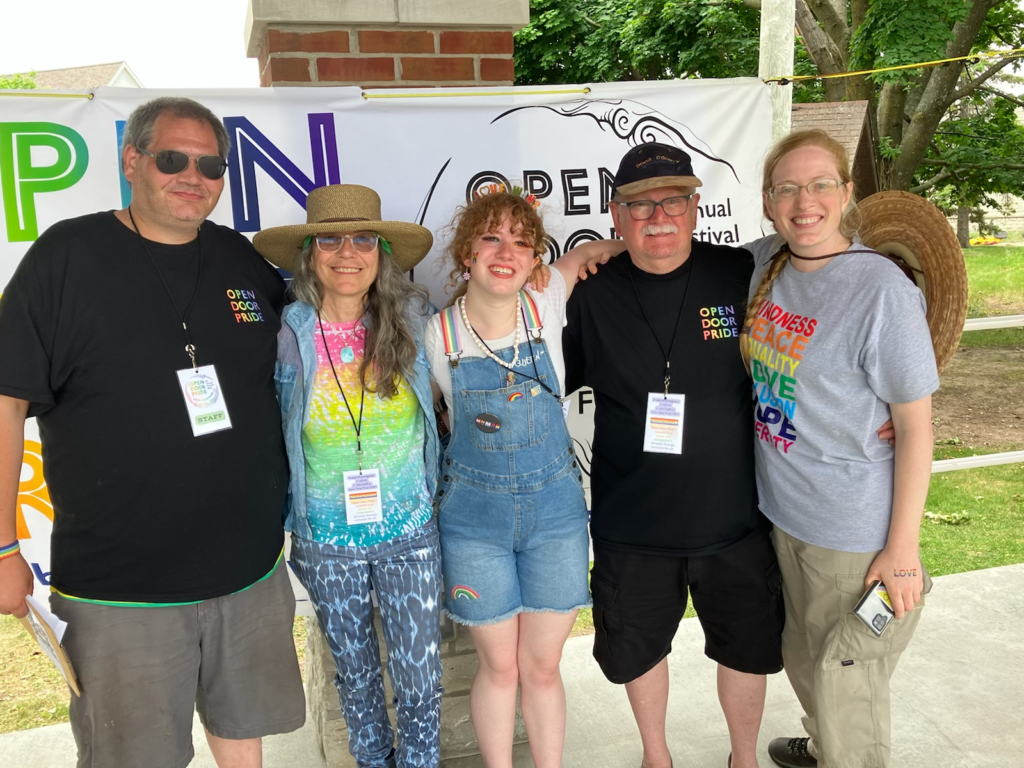
She ran SAGA throughout her high school career, and after she graduated in 2022, Sevastopol faculty members and SAGA co-advisers Melissa Malcore and Lynn Kotte took over running the club’s semimonthly lunchtime meetings. Though the leadership has changed, the goal of the club remains the same: to help LGBTQ+ students “understand that there’s a place for you and that you’re not alone,” Kotte said.
Pride across the Peninsula
Before SAGA started at Sevastopol, the Gay-Straight Alliance – later rebranded as the Gender and Sexuality Alliance (GSA) – brought together LGBTQ+ students at Sturgeon Bay High School. This group formed about 10 years ago, according to Jennifer O’Handley, a high school counselor at Sturgeon Bay and an adviser for the GSA.
Like Sevastopol’s SAGA, Sturgeon Bay’s GSA serves as both a social space and an opportunity to share education about LGBTQ+ topics, though its exact role shifts every year courtesy of its ever-changing group of student participants, O’Handley said.
“It tends to be a group for underclassmen,” she said. “It’s not that older students can’t participate, but I feel like when they get to their upper years, they have a place where they fit, and they don’t need [the GSA] as much.”
Participation levels vary, too: “Sometimes we’ll have two or three kids; sometimes we’ll have 20” showing up to GSA meetings, O’Handley said.
The same is true of Gibraltar’s Diversity Acceptance Alliance (DAA), said high school art teacher and DAA adviser Emily Salm. DAA started small in 2016, when a single student would attend meetings, she said. Attendance grew through the years, but even if it hadn’t, Salm said she would have kept going.
“I felt like if we can reach one student, then it’s worth it,” she said.
Unlike Sevastopol’s SAGA and Sturgeon Bay’s GSA, Gibraltar’s DAA isn’t specifically for LGBTQ+ students. Instead, it focuses more generally on social-justice issues. In addition to learning about topics such as pronoun usage and gender identity, DAA members also discuss racial equity, body-image issues and bullying. They often take their own struggles to the meetings and work with other members on solutions.
“The kids have a lot of fun, even though the topics we discuss can be heavy,” Salm said.
A similar group – this one called Allies in Diversity (AID) – meets at Southern Door and focuses on various social issues, said AID co-founder and Southern Door English teacher Sarah Ritchie. In addition to making students more equitable in school, she said she hopes it will give them a better framework for understanding the world when they graduate.
“I grew up in Arkansas, and my graduating class was 400-something people,” Ritchie said. “I was surrounded by diversity. That’s not really the case here, but this club helps [students] understand other groups of people so that it’s not this culture shock when they go to places like Green Bay and Milwaukee later.”
After-School Advocacy
Student-organization facilitators aren’t the only adults advocating for the county’s LGBTQ+ youth. Allies can also be found at school board meetings – especially ones that cover hot-button LGBTQ+ issues, such as recent Gibraltar meetings where nondiscrimination policies for transgender students were discussed.
Angela Sherman, a former school board member at Gibraltar, attended these meetings in part because of conversations she has had with her three children.
“We talk a lot about how they can stand up for other kids,” Sherman said.
Through such conversations, Sherman knows that having LGBTQ+ classmates is a non-issue for many kids, including her own.
“Adults often make a bigger deal out of it than students do,” she said.
Another parent, Olivia Lowry, attended the Gibraltar meetings on behalf of Northern Door Pride (NDP), an LGBTQ+ organization for which Lowry volunteers.
One of NDP’s long-term goals is to start a student mentorship program, Lowry said – and in the process of establishing such a program, it’s crucial for NDP to show its support for LGBTQ+ students.
Door County as a whole is a “really close-knit community, and as a community, it’s absolutely vital to speak on behalf of kids who might not have anybody else,” Lowry said. “There are going to be gender-nonconforming kids and trans kids [at Gibraltar] whose parents don’t get it, and in that case, their school needs to make sure they’re being treated well.”
Why It Matters
Through her 18-year tenure at Sturgeon Bay, O’Handley has seen attitudes about LGBTQ+ issues shift dramatically, both in the school and outside of it. That’s partially because society as a whole has become more accepting, but it’s also thanks to students and teachers advocating for the LGBTQ+ community in the schools, she said.
“The GSA has helped the school grow so much,” O’Handley said.
Despite this overall attitude shift, students today still deal with homophobia and transphobia from a vocal minority of their peers. Often, she said, this looks like cyberbullying, deadnaming (referring to trans people by their birth name rather than their chosen name) and misgendering (referring to a trans person in a way that doesn’t match the individual’s gender identity).
And it doesn’t help that LGBTQ+ kids, and especially transgender kids, have become talking points for homophobes and transphobes in recent years, Lowry said.
“What has shifted is where the conservative right wants to put their focus,” Lowry said. “Back then, they focused on gay people, and that didn’t work. Civil rights persevered. So the focus is shifting now to trans kids and drag queens.”
It’s for this reason that LGBTQ+ kids need more support now than ever – especially in schools, Ritchie said.
“I think in a world that wants to silence [LGBTQ+] voices, it’s crucial that our schools at least provide resources and allow them to ask questions,” Ritchie said.

